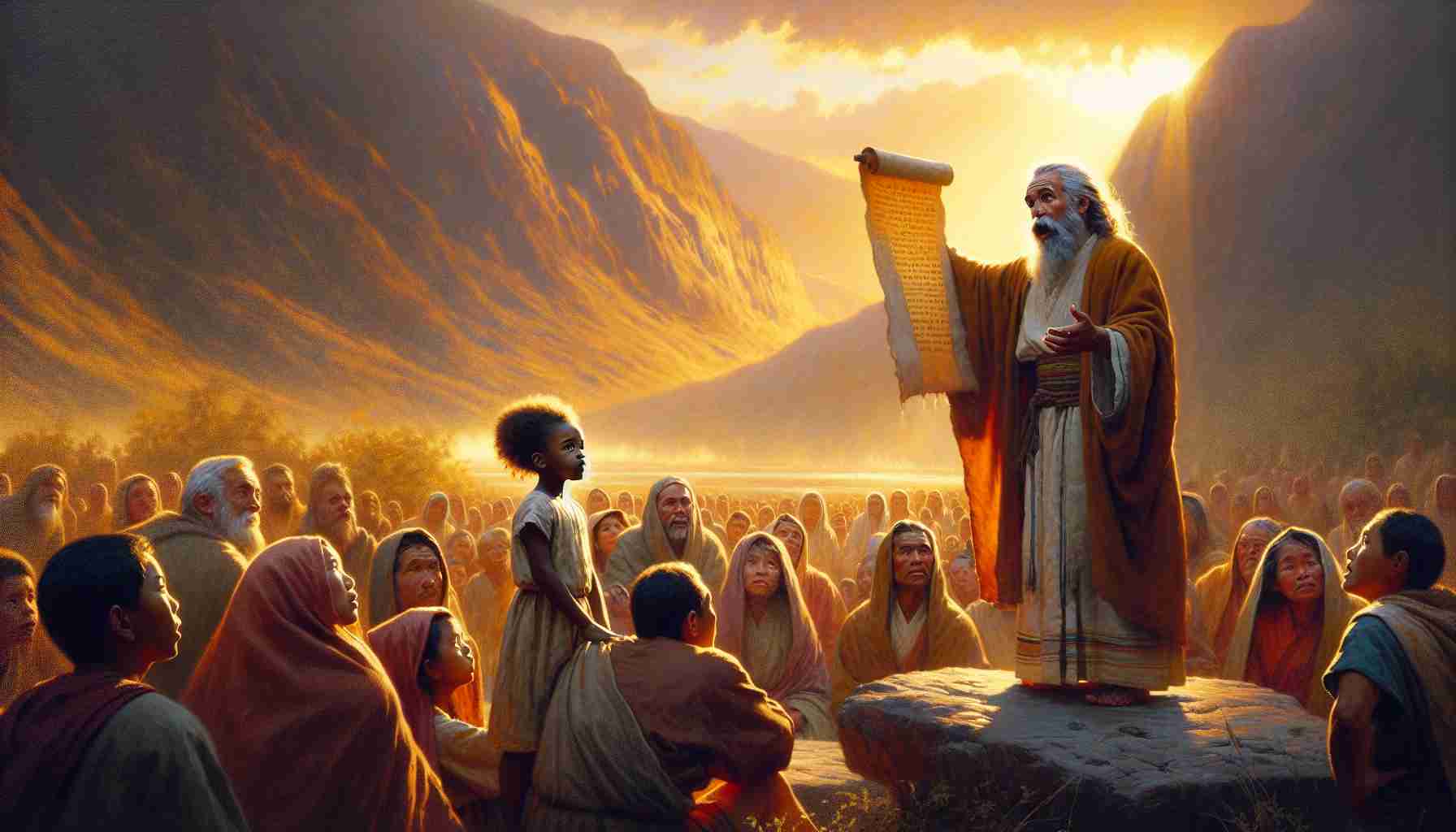

My hands trembled as I held my father’s walking stick. He had passed it to me just weeks before, when the elders gathered around to hear Moses speak again. “You take it,” he said. “I want you to remember what we lived through.”
I was born after we left Egypt—after the plagues, after the sea split in two. But my father had seen Pharaoh’s army buried beneath the waves. He had walked with Moses. Still, even he leaned in to listen when Moses began to speak on the edge of the Jordan River.
Moses didn’t shout that day. His voice was steady, but carried weight like a storm hiding in the distance. “Remember what your eyes have seen,” he warned us. “Do not forget the day you stood before the Lord at Mount Sinai.”
I had heard the tale of that day all my life—how fire and cloud wrapped the mountain, how God gave us the Ten Commandments, how the people trembled but vowed to listen. But now Moses seemed to speak with more urgency, as if this was our last chance to hold on to the truth.
“Do not make images. Do not bow to the sun or stars,” he warned. “For the Lord your God is a consuming fire.”
A chill ran through me. I was young, maybe twenty, strong enough to face enemies in the land ahead, but I suddenly felt small. I thought I had faith—but I realized most of my belief was from stories told by others. They had seen. I had only heard.
But that day, something shifted.
As Moses spoke, I looked around. I saw my people—children chasing one another in the dust, warriors with swords on their backs, women tending to pots and cloths. This was a generation who had not stood at Sinai. We had not seen Egypt. We had only wandered. And yet, Moses begged us to remember.
“How can we remember what we never saw?” I asked my father that night as we sat beneath the stars.
He looked at me and touched the stick now resting beside me. “Because we carry it in what we do. Every word, every law, every Shabbat, every choice to serve only God—it’s all remembrance.”
That night, with the dry wind in my face and Moses’ voice still echoing in my chest, I made my own vow. I would not forget. I would not let my children treat our faith as just stories. I would teach them, live with them, walk with them in God’s ways, as Moses had commanded.
We stood at the edge of promise, but Moses reminded us not just of where we were going—but of where we came from, and Who brought us.
I wasn’t at Sinai. But through Moses’ words, it felt like I was. And that, I realized, was the miracle of remembrance: it binds generations, and keeps our hearts faithful.
My hands trembled as I held my father’s walking stick. He had passed it to me just weeks before, when the elders gathered around to hear Moses speak again. “You take it,” he said. “I want you to remember what we lived through.”
I was born after we left Egypt—after the plagues, after the sea split in two. But my father had seen Pharaoh’s army buried beneath the waves. He had walked with Moses. Still, even he leaned in to listen when Moses began to speak on the edge of the Jordan River.
Moses didn’t shout that day. His voice was steady, but carried weight like a storm hiding in the distance. “Remember what your eyes have seen,” he warned us. “Do not forget the day you stood before the Lord at Mount Sinai.”
I had heard the tale of that day all my life—how fire and cloud wrapped the mountain, how God gave us the Ten Commandments, how the people trembled but vowed to listen. But now Moses seemed to speak with more urgency, as if this was our last chance to hold on to the truth.
“Do not make images. Do not bow to the sun or stars,” he warned. “For the Lord your God is a consuming fire.”
A chill ran through me. I was young, maybe twenty, strong enough to face enemies in the land ahead, but I suddenly felt small. I thought I had faith—but I realized most of my belief was from stories told by others. They had seen. I had only heard.
But that day, something shifted.
As Moses spoke, I looked around. I saw my people—children chasing one another in the dust, warriors with swords on their backs, women tending to pots and cloths. This was a generation who had not stood at Sinai. We had not seen Egypt. We had only wandered. And yet, Moses begged us to remember.
“How can we remember what we never saw?” I asked my father that night as we sat beneath the stars.
He looked at me and touched the stick now resting beside me. “Because we carry it in what we do. Every word, every law, every Shabbat, every choice to serve only God—it’s all remembrance.”
That night, with the dry wind in my face and Moses’ voice still echoing in my chest, I made my own vow. I would not forget. I would not let my children treat our faith as just stories. I would teach them, live with them, walk with them in God’s ways, as Moses had commanded.
We stood at the edge of promise, but Moses reminded us not just of where we were going—but of where we came from, and Who brought us.
I wasn’t at Sinai. But through Moses’ words, it felt like I was. And that, I realized, was the miracle of remembrance: it binds generations, and keeps our hearts faithful.